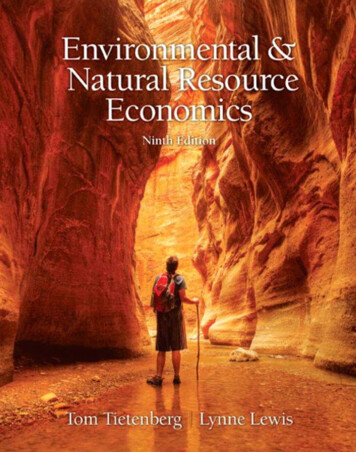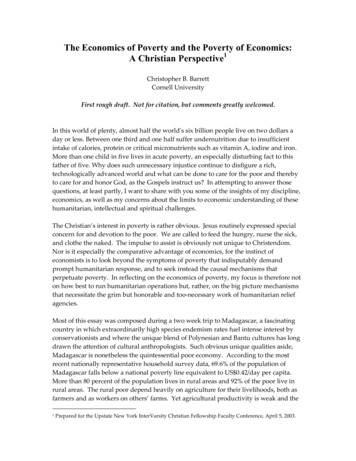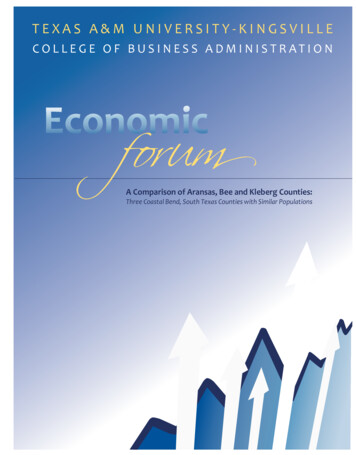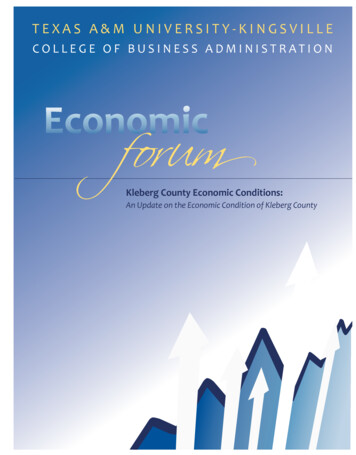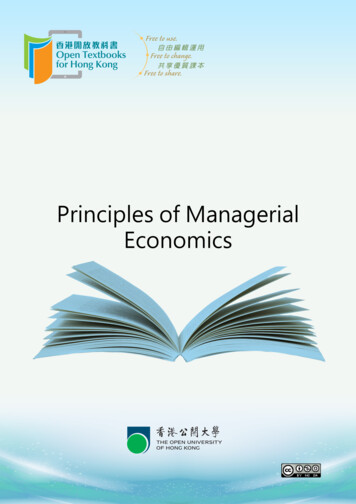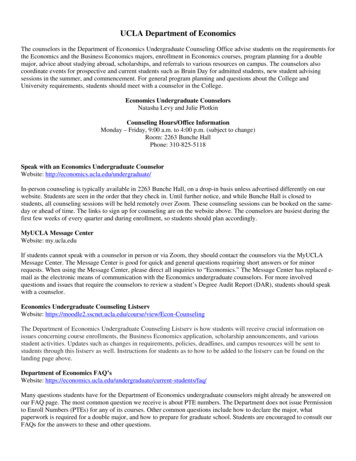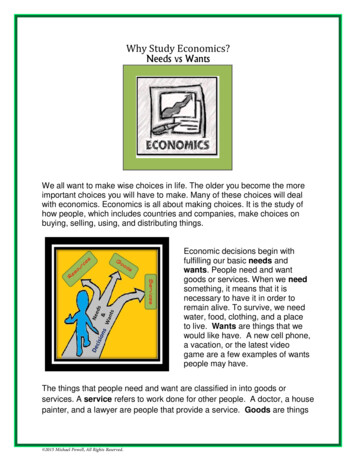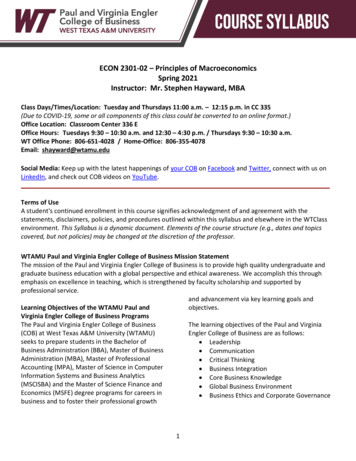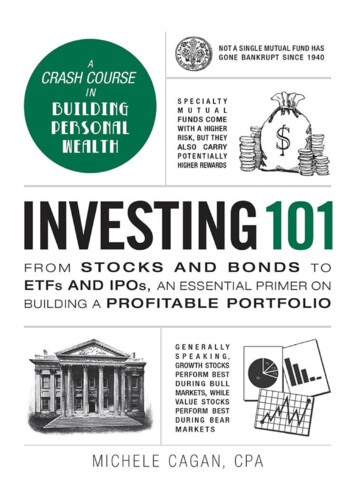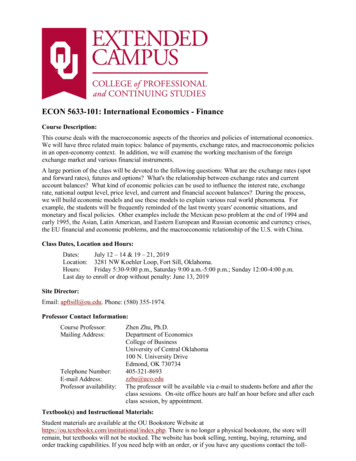
Transcription
ECON 5633-101: International Economics - FinanceCourse Description:This course deals with the macroeconomic aspects of the theories and policies of international economics.We will have three related main topics: balance of payments, exchange rates, and macroeconomic policiesin an open-economy context. In addition, we will examine the working mechanism of the foreignexchange market and various financial instruments.A large portion of the class will be devoted to the following questions: What are the exchange rates (spotand forward rates), futures and options? What's the relationship between exchange rates and currentaccount balances? What kind of economic policies can be used to influence the interest rate, exchangerate, national output level, price level, and current and financial account balances? During the process,we will build economic models and use these models to explain various real world phenomena. Forexample, the students will be frequently reminded of the last twenty years' economic situations, andmonetary and fiscal policies. Other examples include the Mexican peso problem at the end of 1994 andearly 1995, the Asian, Latin American, and Eastern European and Russian economic and currency crises,the EU financial and economic problems, and the macroeconomic relationship of the U.S. with China.Class Dates, Location and Hours:Dates:July 12 – 14 & 19 – 21, 2019Location: 3281 NW Koehler Loop, Fort Sill, Oklahoma.Hours:Friday 5:30-9:00 p.m., Saturday 9:00 a.m.-5:00 p.m.; Sunday 12:00-4:00 p.m.Last day to enroll or drop without penalty: June 13, 2019Site Director:Email: apftsill@ou.edu. Phone: (580) 355-1974.Professor Contact Information:Course Professor:Mailing Address:Telephone Number:E-mail Address:Professor availability:Zhen Zhu, Ph.D.Department of EconomicsCollege of BusinessUniversity of Central Oklahoma100 N. University DriveEdmond, OK 730734405-321-8693zzhu@uco.eduThe professor will be available via e-mail to students before and after theclass sessions. On-site office hours are half an hour before and after eachclass session, by appointment.Textbook(s) and Instructional Materials:Student materials are available at the OU Bookstore Website . There is no longer a physical bookstore, the store willremain, but textbooks will not be stocked. The website has book selling, renting, buying, returning, andorder tracking capabilities. If you need help with an order, or if you have any questions contact the toll-
free phone at 1-(855)-790-6637, agents are available from 9a – 5p (EST) Monday – Friday. For moreinformation or questions about textbooks, feel free to contact apsyllabi@ou.edu. Text prices are availableonlineKrugman, P., Obstfeld, M., & Melitz, M. (2014). International economics: Theory and policy (10th ed.).Boston, MA: Addison Wesley. ISBN 9780133423648. There is also a companion book website ackid 046c8026&strackid 18a7ea18&ii 3.Course Objectives:Upon completion of the course, students should be able to understand the economic theories about thedetermination of national economic activities, and interaction of various macroeconomic variables in theopen economy context at a more advanced level; to understand and evaluate the impact ofmacroeconomic policies on national and international economies; and to thoroughly understand andcritically assess the current economic events.The student will be able to:1. understand major international financial theories;2. understand the consequences of macroeconomic policies in an open economy; and analyzeinternational financial issues using a simplified and unified framework.Assignments, Grading and Due Dates:Course Outline:I.II.IntroductionNational Income Accounting and Balance of Payments AccountIII.Exchange Rates and Foreign Exchange MarketIV.Determination of Output, Exchange Rates and Prices in the Short Run and Long RunV.VI.VII.Fixed Exchange Rate Systems and Foreign Exchange InterventionComparison of Fixed and Floating Rate SystemsOptimum Currency Areas and the European ExperienceFinal Exam:There will be a final exam.Post Seminar Assignment:A term paper (15 pages at least, including references and tables and graphs) dealing with internationalfinancial issues will account for 30% of the course grade for satisfactory completion. Topics need to bediscussed with and approved by the professor. Due Date: August 4, 2019Grading:This is a letter-graded course: A, B, C, D, or F.AssignmentDue DatePercent of GradeFinal ExaminationLast day of class70%Post Seminar AssignmentAugust 4, 201930%Notice: Failure to meet assignment due dates could result in a grade of I (Incomplete) and may adverselyimpact Tuition Assistance and/or Financial Aid.2
POLICIES AND NOTICESAttendance/Grade PolicyAttendance and participation in interaction, individual assignments, group exercises, simulations, roleplaying, etc. are valuable aspects of any course because much of the learning comes from discussions inclass with other students. It is expected that you attend all classes and be on time except for excusedemergencies.Excused absences are given for professor mandated activities or legally required activities such asemergencies or military assignments. It is the policy of the University to excuse absences of students thatresult from religious observances and to provide without penalty for the rescheduling of examinations andadditional required class work that may fall on religious holidays. Unavoidable personal emergencies,including (but not limited to) serious illness; delays in getting to class because of accidents, etc.; deathsand funerals, and hazardous road conditions will be excused.If you are obtaining financial assistance (TA, STAP, FA, VA, Scholarship, etc.) to pay all or part of yourtuition cost, you must follow your funding agency/institution’s policy regarding “I” (Incomplete) gradesunless the timeline is longer than what the University policy allows then you must adhere to theUniversity policy. Students who receive Financial Aid must resolve/complete any “I” (Incomplete) gradesby the end of the term or he/she may be placed on “financial aid probation.” If the “I” grade is notresolved/completed by the end of the following term, the student’s Financial Aid may be suspended makethe student ineligible for further Financial Aid.Students are responsible for meeting the guidelines of Tuition Assistance and Veterans Assistance. Seethe education counselor at your local education center for a complete description of your TA or VArequirements.Academic Integrity and Student ConductAcademic integrity means honesty and responsibility in scholarship. Academic assignments exist to helpstudents learn; grades exist to show how fully this goal is attained. Therefore all work and all gradesshould result from the student's own understanding and effort.Academic misconduct is any act which improperly affects the evaluation of a student’s academicperformance or achievement. Misconduct occurs when the student either knows or reasonably shouldknow that the act constitutes misconduct. Academic misconduct includes: cheating and usingunauthorized materials on examinations and other assignments; improper collaboration, submitting thesame assignment for different classes (self-plagiarism); fabrication, forgery, alteration of documents,lying, etc in order to obtain an academic advantage; assisting others in academic misconduct; attemptingto commit academic misconduct; destruction of property, hacking, etc ; intimidation and interferencewith integrity process; and plagiarism. All students should review the Student’s Guide to AcademicIntegrity at http://integrity.ou.edu/students guide.htmlStudents and faculty each have responsibility for maintaining an appropriate learning environment. Allstudents should review policies regarding student conduct at http://studentconduct.ou.edu/Accommodation StatementThe University of Oklahoma is committed to making its activities as accessible as possible. Foraccommodations on the basis of disability, please contact your local OU Site Director.Adjustment for Pregnancy/Childbirth-Related IssuesShould you need modifications or adjustments to your course requirements because of documentedpregnancy-related or childbirth-related issues, please contact me as soon as possible to discuss. Generally,modifications will be made where medically necessary and similar in scope to accommodations based ontemporary disability. Please see html.3
Title IX ResourcesFor any concerns regarding gender-based discrimination, sexual harassment, sexual misconduct, stalking,or intimate partner violence, the University offers a variety of resources, including advocates on-call 24/7,counseling services, mutual no-contact orders, scheduling adjustments, and disciplinary sanctions againstthe perpetrator. Please contact the Sexual Misconduct Office at smo@ou.edu or (405) 325-2215 (8-5), orthe Sexual Assault Response Team at (405) 615 -0013 (24/7) to report an incident. To learn more aboutTitle IX, please visit the Institutional Equity Office’s website at http://www.ou.edu/content/eoo.htmlCourse PoliciesAdvanced Programs policy is to order books in paperback if available. Courses, dates, and professors aresubject to change. Please check with your OU Site Director. Students should retain a copy of anyassignments that are mailed to the professor for the course. Advanced Programs does not provideduplicating services or office supplies.Any and all course materials, syllabus, lessons, lectures, etc. are the property of professor teaching thecourse and the Board of Regents of the University of Oklahoma and are protected under applicablecopyright.For more information about Advanced Programs, visit our website at: http://www.goou.ou.edu/4
INSTRUCTOR VITAZhen Zhu, Ph.D.Education1994 Ph.D. in International Economics, Macroeconomics, Econometrics, University of MichiganCurrent Positions Advanced Programs professor since 1997Dr. Michael Metzger Endowed Chair, Professor of Economics, University of Central OklahomaFrequently Taught Advanced Programs Courses Economics 5613Economics 5633Economics 5073International Economics - TradeInternational Economics – FinanceContemporary Economic Policy and AnalysisMajor Areas of Teaching and Research Interest International Financial MarketEnergy Markets (especially natural gas markets)Representative Publications and Presentations “Chinese Natural Gas Market: Huge but Beset with Difficulties.” Natural Gas and Electricity,July 2018, Volume 34, Number 12, pp. 1-7.“Cost of Natural Gas in Eastern Chinese Markets: Implications for LNG Imports,” with YueWang, Energy Forum, International Association for Energy Economists, 2018:1, pp. 13-20.“What motivates merger and acquisition activities in the upstream oil & gas sectors in the U.S.?”with Kuang-Chung Hsu, Michael Wright. Energy Economics, pp. 240-250, June 2017.“Controlling for Relevant Variables: Energy Consumption and Economic Growth NexusRevisited in an EGARCH-M Model”, with Song Zan Chiou Wei, Energy, Vol. 109, 391-399,August 2016.“A Meta-Analysis of the Energy Consumption-Economic Growth Nexus,” with Song Zan ChiouWei, International Journal of Economics and Social Sciences, April 2015.“Forecasting Natural Gas Consumption: China and Japan,” with Chiou Wei Song Zan, FanbeiZhou, Asia-Pacific Economic and Management Review, Vol. 18, No. 1, September 2014, 65-84.“Is the Stock Market Sticker Shocked? A Study of Market Response to CAFE Regulations in theU.S.,” with Mariya Berdina, Michael Wright, Applied Economics, 2014.“The response of U.S. natural gas futures and spot prices to storage change surprises:Fundamental information and the effect of escalating physical gas production,” with Chiou WeiSong Zan and Scott Linn, Journal of International Money and Finance, 2014, Vol. 42, 156-173.“An Economic Analysis of Wind Generation Capacity,” International Journal of Economics andSocial Sciences, with Joe Johnson and Cody Woods, Spring, 2013“The Equivalent Risk Standard and Allowed ROEs in the Gas and Electric Utility Industries,”with Don Murry and Mike Knapp, Journal of Applied Economics and Policy, 2011, Volume 30,Number 1, 47-60.“The Roles of Speculation and Fundamentals in Commodity Markets: The Case of U.S. NaturalGas Market,” with Mengzhu Ji, Hai Lin, Review of Futures Markets, 2011, Volume 19, Issue 3,217-246.“Price Dispersion in a Model with Middlemen and Oligopolistic Market Journal Makers: A Theoryand an Application to the North American Natural Gas Market,” with J.D. Ju, Scott Linn, Journal ofEconomic and Management Strategies, Volume 19, Number 1, Spring 2010, 1–23.“An Empirical Examination of the Impacts of Natural Gas Prices and LNG Transport Costs on theDynamics of LNG Import Demand,” with Don Maxwell, forthcoming in Energy Economics.5
“Stock Market Volatility and Commission Deregulation: Further evidence from Japanese StockMarkets,” with Shinhua Liu, Journal of Financial Services Review, August 2009, V 36, issue 1, 6583.“Government Size and Economic Growth: An Application of the Smooth Transition RegressionModel,” with Chiou Wei Song Zan and Yung-Hsing Kuo, Applied Economics Letters, 2010, Vol.17,1405–1415“GDP Growth and Energy Consumption Revisited: Evidence from Linear and Nonlinear GrangerCausality,” with Song Zan Chiou Wei and Ching-Fu Chen, Energy Economics, Volume 30, Issue 6,November 2008, Pages 3063-3076.“A revisit to the outward FDI determinants: further evidence from count panel data models withfixed effects,” with Song Zan Chiou Wei, Applied Economic Letters. August-October 2007, v.14, issue 10-12, pp. 809-12.“Volatility Impact of Political and Economic Events on Stock Prices: Empirical Evidence fromTaiwan,” with Song Zan Chiou Wei, India Economic Journal, Vol. 55, Number 3, Oct-Dec 2007,page 24-39.“Commodity convenience yield and risk premium determination: the case of the U.S. natural gasmarket,” Energy Economics, 2006.“Asymmetric Price Responses, Market Integration and Market Power: A Study of the U.S. NaturalGas Marke,” with Don Murry, Energy Economics, Vol. 30, page 748-765, 2008."Storage Announcement and Natural Gas Futures Market Volatility," with Scott Linn, Journal ofFutures Market, March 2004, v. 24, iss. 3, pp. 283-313.“EnronOnline and Informational Efficiency in the U.S. Natural Gas Market,” with Don Murry,The Energy Journal, v. 25, iss. 2, 2004 57-74.“Equality of Interest Rates Revisited: The Multi-Country Evidence,” with Chiou Wei Song Zan,International Economic Journal, June 2004, v. 18, iss. 2, pp. 245-57.“Sri Lanka's Experiment with Devaluation: VAR and ECM Analysis of the Exchange RateEffects on Trade Balance and GDP,” with De Silva, Dakshina G.; International Trade Journal,Winter 2004, v. 18, iss. 4, pp. 269-301."Time-Varying Forward Bias and Expected Excess Returns," Journal of International FinancialMarkets, Institutions and Money, 2002.“Sources of Export Fluctuations: Empirical Evidence from Taiwan and South Korea, 19812000”, with Chiou Wei Song Zan, Journal of Asian Economies, 2002.Representative Honors and Awards Received Transformative Learning Scholar, UCO 2014 to presentBarnabas Fellow, UCO, 2011-2012McGraw-Hill/Irwin Distinguished Paper Award, Southwest Society of Economists, 2006Exemplary Service Award, UCO Economics Department, 2004Faculty Research Merit Award, UCO, 2003, 2007, 2011Distinguished Researcher of the Year, College of Business, UCO, 2002Research Fellow, Financial Research Institute, University of Missouri, 2001, 2002Hauptman Fellow for Research Excellence, UCO, 20016
ECON 5633-101: International Economics - Finance Course Description: This course deals with the macroeconomic aspects of the theories and policies of international economics. We will have three related main topics: balance of payments, exchange rate

